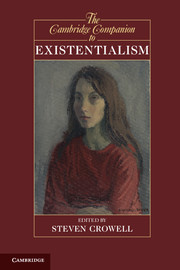Book contents
- Frontmatter
- I Introduction
- II Existentialism in Historical Perspective
- III Major Existentialist Philosophers
- 4 Kierkegaard’s single individual and the point of indirect communication
- 5 “What a monster then is man”: Pascal and Kierkegaard on being a contradictory self and what to do about it
- 6 Nietzsche: after the death of God
- 7 Nietzsche: selfhood, creativity, and philosophy
- 8 Heidegger: the existential analytic of Dasein
- 9 The antinomy of being: Heidegger’s critique of humanism
- 10 Sartre’s existentialism and the nature of consciousness
- 11 Political existentialism: the career of Sartre’s political thought
- 12 Simone de Beauvoir’s existentialism: freedom and ambiguity in the human world
- 13 Merleau-Ponty on body, flesh, and visibility
- IV The Reach of Existential Philosophy
- Bibliography
- Index
- OTHER VOLUMES IN THE SERIES OF CAMBRIDGE COMPANIONS
12 - Simone de Beauvoir’s existentialism: freedom and ambiguity in the human world
from III - Major Existentialist Philosophers
Published online by Cambridge University Press: 28 March 2012
- Frontmatter
- I Introduction
- II Existentialism in Historical Perspective
- III Major Existentialist Philosophers
- 4 Kierkegaard’s single individual and the point of indirect communication
- 5 “What a monster then is man”: Pascal and Kierkegaard on being a contradictory self and what to do about it
- 6 Nietzsche: after the death of God
- 7 Nietzsche: selfhood, creativity, and philosophy
- 8 Heidegger: the existential analytic of Dasein
- 9 The antinomy of being: Heidegger’s critique of humanism
- 10 Sartre’s existentialism and the nature of consciousness
- 11 Political existentialism: the career of Sartre’s political thought
- 12 Simone de Beauvoir’s existentialism: freedom and ambiguity in the human world
- 13 Merleau-Ponty on body, flesh, and visibility
- IV The Reach of Existential Philosophy
- Bibliography
- Index
- OTHER VOLUMES IN THE SERIES OF CAMBRIDGE COMPANIONS
Summary
In July 1940, Simone de Beauvoir began a routine of going to the Bibliothèque Nationale most days from 2.00 to 5.00 p.m. to read G. W. F. Hegel's Phenomenology of Spirit. Hitler's armies had invaded and occupied Paris earlier, on June 14, 1940. She was teaching philosophy classes at a girls' lycée and living in her grandmother's empty apartment. Her close companion, Jean-Paul Sartre, who had been a soldier in a meteorological unit of the French Army, had been captured and was now being held in a German prisoner-of-war camp. Beauvoir was relieved to receive a note from him sent on July 2 saying he was being well treated, but life in Paris was dismal. Food was scarce, and the German troops were grim reminders of Parisians' lack of political freedom. Her reading routine helped soothe the dread, isolation, and alienation she felt. Beauvoir had always been a very earnest student. She had passed the demanding aggregation exam in philosophy at the young age of twenty-one. To supplement her knowledge of classical philosophical texts, she learned German and read texts in phenomenology. In 1935 she had read Edmund Husserl's The Phenomenology of Internal Time-Consciousness “without too much difficulty.” She also read Heidegger and translated long passages into French for Sartre. Back when she was in college, her prodigious work habits had earned her a special nickname among her friends: Castor, or the beaver. Poring over a difficult philosophical text in a foreign language for three hours a day might seem a strange way to get through such times, but with her it made sense.
- Type
- Chapter
- Information
- The Cambridge Companion to Existentialism , pp. 252 - 273Publisher: Cambridge University PressPrint publication year: 2012
- 3
- Cited by



